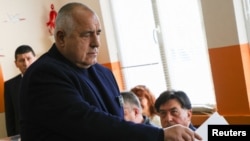After a relatively low turnout of 40% in Bulgaria’s parliamentary elections that were held on Sunday, results show there was no outright winner, and the parties are headed to coalition talks.
Analysts say the results could influence Bulgaria’s position on Russia’s war in Ukraine.
The two-party coalition of GERB-SDS, led by former Prime Minister Boyko Borissov, won the early parliamentary elections with 26.51% of the votes, Bulgaria's Central Election Commission announced on its website, based on unofficial regional results.
The pro-Western reformist coalition We Continue the Change-Democratic Bulgaria, or PP-DB, is in second place with 25%. Revival, with 14% of the votes, is in third place, ahead of DPS, receiving nearly 14% of voter support. The Bulgarian Socialist Party, an heir to the Bulgarian Communist Party, finished with a historically low 9%.
"The biggest setback was the rise of the Russophile Party to third place, gaining 5 percentage points more than last year," said Margarita Assenova, an analyst at The Jamestown Foundation. “This will boost Moscow's influence in Bulgaria and potentially increase calls for a peace settlement of Russia's war against Ukraine, favoring the Kremlin-desired partition of Ukraine."
At the same time, both likely winners share pro-European, pro-NATO positions and strong support for Ukraine. During former Prime Minister Kiril Petkov's government, a secret supply of Bulgarian-made ammunition made its way to Ukraine as early as April 2022, as VOA reported. PP and GERB voted to provide Ukraine with military aid last November.
After casting his ballot, Borissov said a stable government in Bulgaria was the only way out of the crisis.
"With this terrible war in Ukraine, with this redistribution of the world and the entire supply chain, we very clearly have to stand with the democratic world," The Associated Press reported Borissov as saying. Borissov was first elected as Bulgaria`s prime minister in 2009.
In an earlier interview with VOA, Petkov called on EU leaders to introduce the toughest sanctions against Russia in the early days of the full-force invasion and also emphasized his pro-European position at the polls.
"I voted for a normal European life, to have a normal European government, normal European roads, normal European health care, normal European education," he said, according to the AP. Petkov led the Bulgarian government formed by a coalition of four parties between December 2021 and August 2022.
Despite their similar political positions, forming a coalition between two political forces is not a given, experts say.
"Too much hostility has accumulated in the last year to the point that it has been the official political strategy to deny any possibility of future cooperation," Hristo Panchugov, assistant professor at New Bulgarian University, told VOA.
The PP and its ally, Democratic Bulgaria, vowed to never collaborate with GERB and its leader, accusing the party of presiding over rampant corruption during its lengthy rule, Borissov has denied the accusation.
"Even small collaborations on shared policy positions will be extremely difficult. With the local elections coming up in the autumn, the parties will be even more hesitant to enter a partnership that might lead them to lose support," Panchugov said.
But the strong showing of the Russophile parties in this election, Assenova, said, might force two likely winners to cooperate and form a stable two-party coalition.
"It will be a historic chance for GERB and PP to return the country to its hard-earned place and role within Europe and NATO and to wash its face from shameful pro-Russia rhetoric as Moscow's brutal genocidal war against independent Ukraine continues," she said.
Ognyan Minchev, professor of political science at the University of Sofia, Bulgaria, points to other forces that push both political forces to form a coalition. The first one comes from regular Bulgarians who are "fed up with the so-called caretaker government of the president, which practically in many important aspects did not govern," he said.
"Secondly, there is significant pressure from Bulgaria's partners in the European Union within NATO to create a parliamentary majority and normal functional government, because there are many issues that Bulgaria has to address separately and together with its allies in the context of present-day European and world developments," Minchev said.
Thirdly, Minchev said both political forces would benefit from joining the government coalition, which would allow GERB to restore its legitimacy after the massive protests in 2020 against corruption in Borissov's government. It would also help Petkov's political force maintain its electoral support, which has decreased during the last three election cycles.
If the two leading parties cannot form a coalition, Bulgarian President Rumen Radev will form another caretaker government and schedule another national election. For most of the last two years, except for Petkov’s eight-monthslong government from December 2021 to August 2022, Bulgaria has been ruled by technocratic caretaker governments.
Radev is considered friendly to Russia. Both Panchugov and Assenova point to his opposition to sending military aid to Ukraine.
"He has been exploiting gaps in legislative decisions to limit or reduce support towards Ukraine," Panchugov said.
"He even disregarded the parliament's decision to do so. So, we will see another six months of the same, not only regarding the policy towards Ukraine in the war that is going on there, but also in foreign policy, defense policy, rearmament and modernizing of the Bulgarian army," Assenova said.
She pointed out that the president, whose constitutional role is primarily ceremonial, made most foreign policy and defense decisions during the last two years.
Some information for this report comes from The Associated Press, Reuters and RFE/RL.





